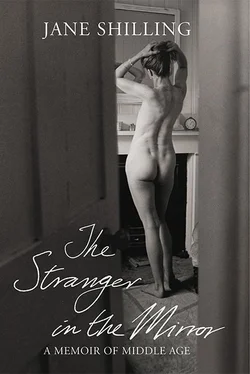This is not a manual of advice on how to cope with the menopause. There is no shortage of those. It is, rather, what Henry James in his Preface to the 1908 New York edition of The Portrait of a Lady , called an ‘ado’. ‘Millions of presumptuous girls, intelligent or not intelligent, daily affront their destiny, and what is it open to their destiny to be, at the most, that we should make an ado about it?’ wrote James, adding, ‘The novel is of its very nature an “ado”… about something.’
By middle age, of course, one has a fair idea of what one’s destiny is to be. Nevertheless, one must continue to affront it, and it seems to me that the struggle is worthy of an ‘ado’. This is not a novel, but it is a story – my story – and, like all stories, it is shaped by omission as well as inclusion. Every woman’s experience of middle age is both universal and particular, and the particularity of my own experience contains some significant omissions. I have never, for example, been married and so I cannot write from experience about the joys and chagrins of middle-aged marriage. What I can do is, as Montaigne put it, ‘tell the truth, as much as I dare – and as I grow older I dare a little more’.
Around the inexorable checkpoint of the menopause a debatable land extends, in which one’s experience of middle age is determined not by this or that arbitrary boundary of years, but by individual sensibility. One becomes, in short, middle aged when one feels oneself to be middle aged, and not before.
‘When I’m grown up…’ children say to one another. But grown-upness, like middle age, is an infinitely receding quality. ‘How old do you feel inside?’ I ask my mother and grandmother as we sit podding peas in the garden one sunny day thirty-five years ago. Thirty-five, says my grandmother, quick as a flash, slitting the pods with her fingernails, sending the peas skipping into the colander with a musical bounce, plink, plink, like a fairy xylophone. She is 71. Twenty-seven, says my mother, who is 44 and wears big glasses for short sight and has short pale eyelashes and her brown hair coiled up into a bun which she skewers to the back of her head with brown wire hairpins like a handful of pine needles.
I have seen pictures in the family photograph album of my mother as a child, kneeling in the wavelets on a Cornish beach, with a halo of white-blonde hair and angel’s wings borrowed from a seagull that flew behind her just as the shutter snapped. I have clocked the photo of her doing a showy-off splits in the sand on the same holiday, dressed in a knitted swimsuit with a swimming-ring around her waist. And I have noted the later pictures of her, a few years older, still with the wavy silver-gilt hair but now with bosoms and long, long legs and a heavy-lidded regard like that of Bette Davis, photographed with her equally pretty (but dark-haired) French penfriend, Françoise, in an assortment of the beauty spots they visited on their exchange trips, or clasping a menagerie of animals that died before I was born, but whose names I have grown up knowing: Trixie, the terrier bitch; Diogenes, the dockyard cat with austere views on interior design, who used to pace along the mantelshelf, fastidiously pushing to the floor any knick-knack that stood in his way.
Though my imagination continues to reject the notion, there is irrefutable evidence in these pictures that my middle-aged mother was once both a child and a teenager. In the later shots she is 16 – a year younger than I am now. Although arithmetic is mainly beneath me, I have done sums. I have worked out that in the year 2000 I shall be 42, or two years younger than my mother is as we sit in the sunshine, podding peas. The maths is undeniable – which is one of the many things I have against mathematics. On the one hand I am in no position to disbelieve the calculations showing that in twenty-five years’ time I shall be 42 and nearly as old as my mother (and she, in turn, will be 69, or nearly as old as her mother). On the other, the fact is that I do disbelieve them.
I peer under my 17-year-old eyelashes at my mother, sitting on the plaid rug on the grass with those long legs tucked up under her sensible skirt. The tender coltishness of the early photographs has vanished. The legs are heavy now, their skimmed-milk pallor etched with a tracery of bluish-purple veins; the toenails sticking out of her flat navy sandals are ridged like limpet shells, the skin of the heels is cracked like old cheese. The muscular calves of someone used to trudging up and down suburban streets encumbered with prams and shopping baskets are covered in a springing growth of cobwebby hairs.
It looks (I think, getting up to pick some mint to go with the peas) as though some sort of bad spell was cast over the golden-haired teenager with the kitten and terrier and the pretty French penfriend in the album pictures. As though a spiteful magician had come along and shut her up in a carapace of thickened limbs and mottled skin, from which only her heavy-lidded Bette Davis eyes peer out, myopic but still recognisable, behind the big lenses of her spectacles.
Whatever the sums say, whatever the photographic evidence, I am quite certain that the same spell is not going to be cast over me. I wonder, briefly, if my mother is secretly harbouring a similar disbelief at the idea that time will turn her into an old woman like my grandmother, and conclude that she can’t be. She seems bizarrely unaware of the way she occupies space, of the body she inhabits. Minutely aware as I am of the pores on my adolescent nose, the precise state of development of every tiny blemish, of every minuscule change in the size of my almost non-existent bosom, of the position of each hair in the arch of my eyebrows, I find it hard to understand how someone can get up in the mornings, contemplate their reflection in the mirror, even draw breath, looking as my mother does.
Perhaps, I speculate, once you reach a particular age – 25, perhaps (a quarter of a century has a certain knell-like resonance), or 30, or 35, the halfway mark of the biblical three score and ten – some kind of grown-up phenomenon ensures that you just stick right there. Some trick of perception means that when you look in the mirror, the reflection you see there isn’t you as everyone else sees you, not the ridged, veined, hirsute husk that has accumulated over the years like some old caddis fly’s dwelling of sticks and stones and bits of weed, but the person you were when you got stuck.
As I formulate this hypothesis, I can see that it contains some significant lacunae. I’m not entirely clear, for a start, whether the gap between yourself as you are and the person you feel yourself to be is a process of active self-delusion – whether you decide at 27 or 35 that this is the face you will henceforth see in the mirror, or whether the self-deception mechanism simply kicks in automatically one day. A passage in Nancy Mitford’s Love in a Cold Climate confirms the phenomenon without altogether clarifying it.
‘What was she like when she was young?’ (asks the teenaged narrator, Fanny, about a terrifying old battleaxe, Lady Montdore, who is in her sixties and looks like a Grenadier guardsman in drag).
‘Exactly the same as she is now,’ replies Fanny’s fiftysomething uncle, Davey. ‘I’ve known her ever since I was a little tiny boy and she hasn’t changed one scrap.’
‘I left it at that’ (writes Fanny). ‘It’s no good, I thought, you always come up against this blank wall with old people, they always say about each other that they have never looked any different, and how can it be true?’
This seems to suggest that the peculiar not-seeing of themselves by grown-ups – their preposterous conviction in the teeth of the evidence that they’re still in the prime of life – is just another of the arbitrary tricks that nature every so often plays on the unsuspecting person. At 17, I have not yet emerged from the grip of late adolescence and so I am quite used to these. At 13, 14 and 15, the rest of my year at my girls’ grammar school were turning into women. One moment they were galloping up and down the playground, pretending to be horses and playing jacks on the music-room steps. The next, they had acquired the appendages of our teachers and mothers – bulging chests contained within hammocky bras; a tendency to conduct interminable conversations in complicit undertones, a mysterious smell of iris mixed with cat pee when they put their hands up to answer a question in class, and something else, a sort of self-important languor that distanced them irrevocably from the world of pretend horses and jacks in which I was left behind.
Читать дальше












